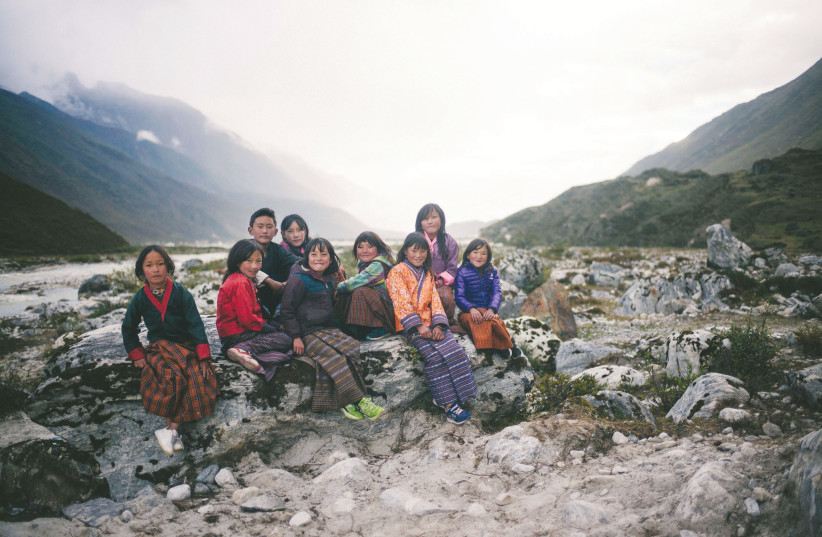Lunana: A Yak in the Classroom, which is opening on July 7 all over Israel, was the first film from Bhutan to be nominated for an Oscar (in the Best International Feature category), but it is more than just a curiosity. Absorbing and magical, it’s a movie that some viewers will find too slow but which will reward those who have patience with a near-total immersion in a parallel universe, one that has not changed for centuries, and which features all-encompassing beauty and a simpler way of life.
The story of Ugyen
Directed by Pawo Choyning Dorji, the movie is named for the remote mountain village where it takes place. It tells the story of Ugyen (Sherab Dorji), a teacher who lives in the relatively populous Bhutanese capital of Thimphu and dreams of moving to Sydney to make it as a singer as soon as he has finished his five required years of government service. But when his boss tells him he is being transferred to Lunana for his final year as a teacher, he balks, telling her he has a problem with high altitudes, to which she replies that he has “an attitude problem, not an altitude problem.”
Bhutan, a predominantly Buddhist nation, has a program that promotes something called “Gross Domestic Happiness,” which is referenced in the movie, although the script lets us figure out for ourselves exactly what that might mean. To Ugyen, it means playing Creedence Clearwater Revival songs in a club and surfing the Internet.
Spending a year in a town at an elevation of more than 3,300 m. (as a point of comparison, that is about 500 m. higher than Mount Hermon) that takes days to get to – the last leg of the journey requires a five-day trek on foot through the mountains – with no electricity (except for brief moments when a solar panel is activated) is close to his idea of hell.

BUT OFF he goes, although he freaks out the moment he arrives, asking to turn around and head straight home. Fortunately for the audience, the donkeys have to rest for a few days and by then he has gotten into the rhythm of life in this village of just 56 people. Part of the fun of this movie is learning, along with Ugyen, just what it is like to live in a place like this, where dried yak dung provides the only real heat, chalk has to be made out of whatever is at hand and it takes days to get any kind of a message out to the rest of the world. Millions of people around the world live like this and Lunana shows that there is great beauty in this way of life, it does not shy away from some of the harsh truths about it. People die from relatively minor ailments, because there is no way to get them to a hospital, including women who perish while giving birth. There are alcoholics and broken families here, as there are in any place in the world.
But while the landscape is almost unbelievably pristine – and the scenery will leave you breathless – it is the people who make Ugyen want to stay. These include a preternaturally winning little girl named Pem Zam, who impresses him with her determination to learn, and a spiritual and lovely young woman, a yak herder named Saldon (Kelden Lhamo Gurung), who teaches him folk songs and helps explain the Lunana way of life to him. The cast features many non-professionals from Lunana and they hold the screen brilliantly. Even the titular yak in the classroom, named Norbu, has screen presence.
It’s probably no coincidence that the yak has this name, which we are told means wish-fulfilling jewel and which may also be a reference to the first director to make movies in Bhutan, Khyentse Norbu. Lunana’s director, Dorji, worked on one of Norbu’s films, which include The Cup, a drama about exiled Tibetan monks and their young students who find a way to watch the World Cup, and Travelers and Magicians, a movie about a young man in Bhutan, who is very similar to Ugyen at the beginning of Lunana. Both of these are wonderful films that are worth tracking down.
Ugyen’s journey to becoming a better teacher and person through spending time with Lunana’s residents is predictable, but nonetheless makes for engaging viewing, and it is inspiring to see how the opportunity to learn gives these children and their parents hope.
There is a mini genre of movies about teachers in remote areas who fall in love with the community: Conrack, based on Pat Conroy’s memoir, The Water is Wide, and Hiner Saleem’s My Sweet Pepper Land, the story of a female teacher in Kurdistan and the ex-soldier who protects her, are two that come to mind. Lunana is a worthy addition to this genre and, for what it’s worth, I found it infinitely more interesting and satisfying than the ultra-pretentious movie that did win Best International Feature this year, Ryusuke Hamaguchi’s Drive My Car. In any case, Lunana is a very different film from Drive My Car and it’s one that will be likely to stay with you long after the movie is over.
